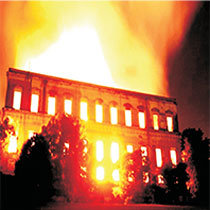A museum turned into an incineration facility for relics of the past
A museum turned into an incineration facility for relics of the past
Posted September. 05, 2018 07:24,
Updated September. 05, 2018 07:24

The historical relations of France and Germany are often compared with those between Korea and Japan. France and Korea suffered painful rule by Germany and Japan, respectively, during World War II.
I made a visit to the War Museum with a 30-year history in the northern city of Caen, France. The city is famous as a historical place where Normandy landings were carried out in June 1944, leading to the fall of the German armies.
At the museum with around 650,000 visitors every year, it came as a surprise to me that historical records were kept in a great deal of amounts for display, projected from a decent and reserved historical viewpoint.
France would not have been able to show calmness and composure regarding its humiliating history, if Germany had not paid a moment of thorough self-reflection to itself.
Upon arriving Armenia on a recent visit, German Chancellor Angela Merkel offered flowers to a monument built in commemoration of the victims of the mass killings by the Ottoman Empire, a German ally during World War I. Also, German Foreign Affairs Minister Heiko Maas repeatedly expressed his apologies during his visit to the Auschwitz concentration camp in Poland, promising that Germany will keep taking the accountabilities for the wrongdoings of the Nazis. Furthermore, former German President Joachim Gauck even attended a commemorative event for the 100th anniversary of the Battle of Amien, which triggered the loss of Germany during World War I. These are a series of Germany’s efforts to apologize for its wrong history.
Then, let us turn to Japan. A separate section at the War Museum in Caen is dedicated to exhibit the colonialism across Asia by Japan, one of Germany’s allies during World War II. Here, a video footage of PG15, is displayed regarding the Japanese invasion of Nanking and the following mass killings. Including a Chinese professor’s explanation, it depicts the personal testimonies of survivors of the war including a Chinese woman, who witnessed Japanese troops break into her house, assassinate her parents, and rape and kill her two elder sisters.
However, there was not any single record on display demonstrating the stories of Korean comfort women – sex slaves for Japanese troops during World War II – and forced labor victims. Comparatively, the issue of Korean comfort women has not been widely known in France, mainly due to Japan’s stubborn interventions. In March, Lee Yong-su, a comfort woman victim, was given a chance to speak at the French lower house in March, but there were only a couple of people in the audience, merely including chairpersons of the Korea-France Friendship Association at both houses of the French Parliament. Such a low attendance was because of the Japanese Embassy’s persuasion for French lawmakers not to participate. French Senator Catherine Dumas was among the audience, confessing after Lee’s speech that she had not even been aware of the issue before.
In some way, nevertheless, it is seen desirable for France and Germany, the victim and the accuser during World War Two, to work togther to lead the European continent. The two have jointly established an economy of large scale that binds European countries together, while protecting themselves from the influences of the United States and China and realizing their practical national interests. In contrast, historical issues have been a ball and chain for Korea and Japan. No progress has been made in their relations. It is wished that Japan did it right someday as Germany has done. If it ever happens by any chance, could Korea do as France does?
Jung-Min Dong ditto@donga.com







